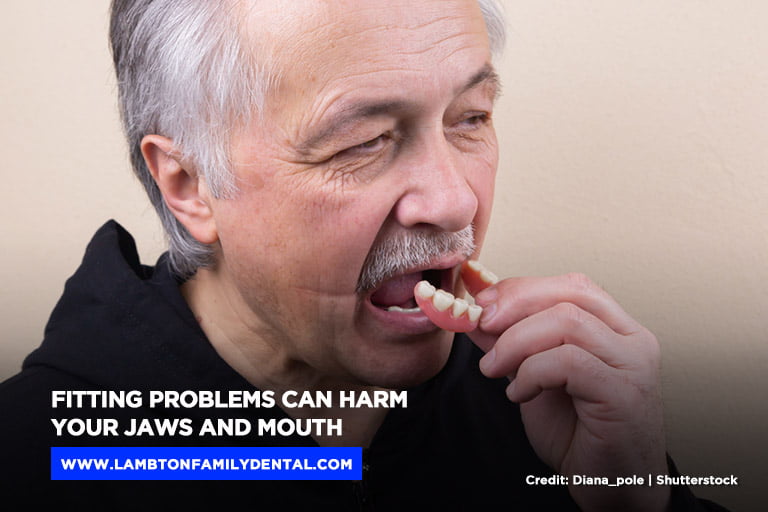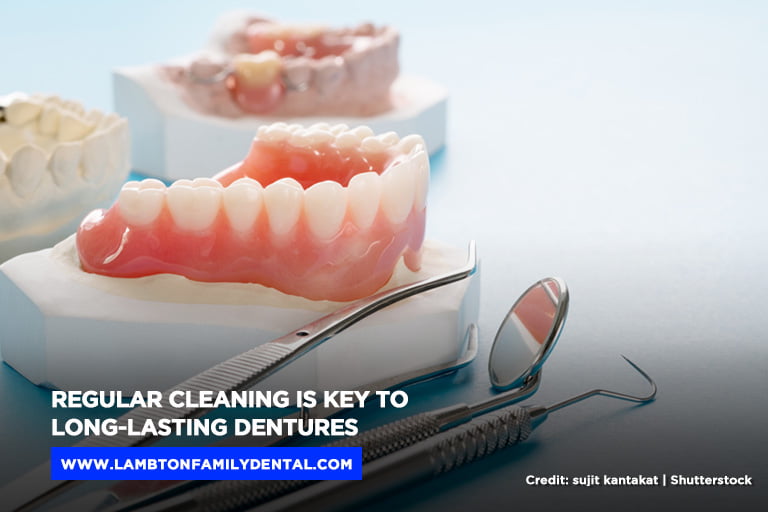Teeth, no matter how strong they are, are prone to deterioration and injury. People frequently lose their teeth for a wide range of reasons. Dentures, thankfully, provide a solution for missing teeth. It is also a very cost-effective solution.
While dentures have been worn for a long time and have been improved to look more natural and feel more comfortable, there are still certain concerns that might arise when wearing fresh dentures. It is critical to properly care for your new set of teeth to reduce the likelihood of these issues.
What Are Common Problems With Dentures?
Dentures, while useful, are not without flaws. Issues may emerge if they are not properly cared for or altered. These are some common concerns that must be addressed right away, ranging from slipping to feeling comfy to generating bad breath:
- Bad Breath
Dentures can store bacteria that cause foul breath if not carefully cleaned. Food and drink particles, as well as bacteria, can become caught in the crevices of your dentures. If not completely cleaned, they can congregate and multiply, giving off a terrible odour.
Dry mouth, which is frequent among denture wearers, exacerbates the condition. Bacteria thrive in a dry mouth. Bad breath might occur if your mouth produces less saliva to keep it moist. Finally, denture discomfort and inflammation in the gums might lead to the development of halitosis.
- Chewing or Speaking Difficulty
It takes practice to eat and converse with dentures. Dentures are less stable and prone to fall out of position since there isn’t much gum or bone underneath to resist movement. In fact, chewing meals with new dentures can take up to 5 times longer.
- Excessive Saliva Production
Excessive salivation is a natural reaction to new dentures. Your salivary glands become active and begin to produce more saliva than your mouth requires.
But don’t worry, it will go away as your mouth reacts to your new dentures.
- Denture Fitting Problems

It takes some time to get adjusted to new dentures. It is natural to feel them slipping out of place when you grin, laugh, speak, or cough. Unlike natural teeth, which are securely implanted in your gums and jaw, dentures require your muscles to work overtime to keep them in place. Biting them down usually works, but you can also use denture adhesive for more support. However, loose denture problems can also be caused by physiological changes in your mouth, as the bone in your jaw shrinks over time.
Loose or ill-fitting dentures can cause pain by rubbing against the delicate tissues of your gums. Upper denture problems can make it difficult to enjoy your food. Because it covers taste buds on the roof of your tongue, a small slip can make it difficult to taste.
- Gum and Mouth Pain
It is common to experience discomfort or inflammation in your mouth after installing your dentures. Again, it takes some getting used to. Over-the-counter creams, lubricants, and pain relievers can help. Request a prescription from your dentist and carefully follow the instructions.
If the pain persists, it could be due to the fit of your dentures. The discomfort may be caused by dentures that do not fit properly into your gums, putting additional pressure on a specific area. Similarly, painful spots can be caused by poor dental hygiene. As a result, bacteria and fungi can build up and inflame your gums.
- Jaw Disorder
Your lower denture problems may be causing jaw issues, such as popping or grinding. In the worst-case scenario, you may have a temporomandibular joint dysfunction (TMJ). The temporomandibular joints connect your skull to your jaw and allow you to move your jaw up and down and side to side.
Dentures should ideally be made to provide you with the best possible bite. However, some dentists may still use outdated bite measurement techniques. As a result, your dentures do not provide you with an optimal bite. Your jaw joint and muscles will not be able to perform as efficiently as they normally do if they are badly made and fitted. In the long run, your muscles will deteriorate and your jaw joint will become dislocated.
Even if dentures are correctly designed, jaw diseases might occur if they are not utilized as suggested by your dentist or are not updated when necessary.
- Strange Facial Expressions
Your dentures should appear as natural as possible. The size and fit of your dentures might have an impact on how your face moves. Your mouth will lose support if your dentures are too short, and your nose will move closer to your chin. Your wrinkles will deepen, your face will shorten, and you will appear older as a result of this.
Additionally, it can make your face look odd if the size isn’t set appropriately.
Teeth that are too large, also known as “Chicklet teeth,” will expose too much gum and require more muscle power to move. If your dentures are too small, they will make your face appear flat. It will be tough for you to express yourself or eat in either case.
Clean Your Dentures

Food and plaque adhere to dentures in the same manner that they adhere to natural teeth. After eating and drinking, dental plaque builds on dentures and teeth, forming a sticky film of germs. Plaque can build up on your dentures if you don’t clean them regularly, putting you at risk for gum disease and bad breath.
Cleanings should be done regularly to maintain your oral health. Brush your dentures at least once every day. It’s even better if you brush them twice a day, in the morning and at night. Dentures must be cleaned thoroughly each night after removal if they are to last a long time.
When to Call Your Dentist
Dental visits are an important element of maintaining your oral health. Have regular dental checkups with your dentist every 6 months if you wear dentures. If you have any worries regarding your dentures, you should also contact your dentist.
Make an appointment if you have any of the following problems and symptoms of ill-fitting dentures:
- Discomfort
- Slipping
- Noise or popping when conversing or eating
- Worn or broken
- Oral source, bleeding gums, and bad breath
Adjust Your Dentures
Allowing any of these denture issues to get the best of you is never a good idea. Wearing the ideal smile has the extraordinary capacity to improve your confidence.
Your smile is our main priority at Lambton Family Dental. Get your dentures from a dentist in Sarnia, Ontario. Call us at (519) 344-5747!

